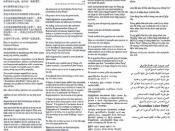Gender stereotyping, the channeling of boys and girls from an early age into jobs orprofessions suited to their sex, has played a significant role in women's struggle for equality inthe workplace. During the seventeenth and eighteenth centuries, formal education was seen asnecessary only for boys; girls received instruction only in what they needed to know to behomemakers. To make matters worse for female laborers, workingmen often saw them as threatsto their status, especially as new machines permitted less skilled operatives to perform tasksformerly assigned to craftsmen. Thus, it is not surprising that as men attempted to unionize inorder to combat declining pay and status, their leaders often ignored female workers.
The Knights of Labor, established in 1869, was the first large-scale national laborfederation in the United States. In 1881, its members voted to admit women. The organizationgrew significantly in the mid-1880s after a series of successful strikes. Stressing equal payregardless of sex or color, the Knights relied heavily on the organizing efforts of women such asthe beloved widow, Mary Harris Jones, better known as Mother Jones.
By the 1890s, the Knightsof Labor, weakened by lost strikes, poor investments, and battles with the newly formedAmerican Federation of Labor (AFL), no longer carried much weight in the labor movement. Itsearly demise, however, could not detract from the unprecedented role played by the Knights ofLabor in the promotion of women in the work force. The most successful union at the turn of thetwentieth century was the AFL. Unfortunately for women workers, Samuel Gompers, its firstpresident, shared society's belief that a woman's place was in the home. It was the union's standthat it is wrong to permit any of the female sex of our country to be forced to work, as webelieve that men should be provided with a fair wage in order to...


